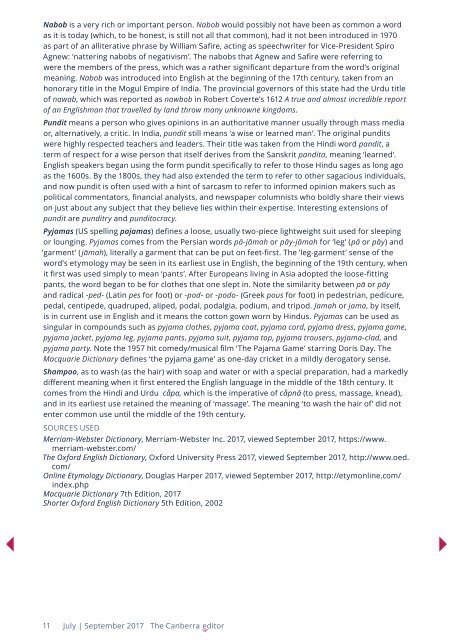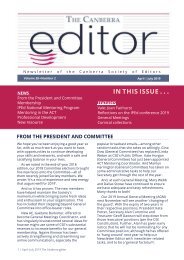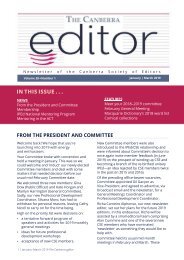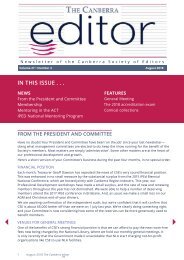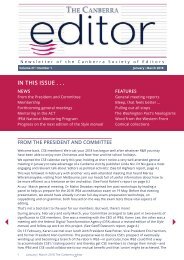The Canberra Editor July-September 2017
Newsletter of the Canberra Society of Editors
Newsletter of the Canberra Society of Editors
Create successful ePaper yourself
Turn your PDF publications into a flip-book with our unique Google optimized e-Paper software.
Nabob is a very rich or important person. Nabob would possibly not have been as common a word<br />
as it is today (which, to be honest, is still not all that common), had it not been introduced in 1970<br />
as part of an alliterative phrase by William Safire, acting as speechwriter for Vice-President Spiro<br />
Agnew: ‘nattering nabobs of negativism’. <strong>The</strong> nabobs that Agnew and Safire were referring to<br />
were the members of the press, which was a rather significant departure from the word’s original<br />
meaning. Nabob was introduced into English at the beginning of the 17th century, taken from an<br />
honorary title in the Mogul Empire of India. <strong>The</strong> provincial governors of this state had the Urdu title<br />
of nawab, which was reported as nawbob in Robert Coverte’s 1612 A true and almost incredible report<br />
of an Englishman that travelled by land throw many unknowne kingdoms.<br />
Pundit means a person who gives opinions in an authoritative manner usually through mass media<br />
or, alternatively, a critic. In India, pundit still means ‘a wise or learned man’. <strong>The</strong> original pundits<br />
were highly respected teachers and leaders. <strong>The</strong>ir title was taken from the Hindi word pandit, a<br />
term of respect for a wise person that itself derives from the Sanskrit pandita, meaning ‘learned’.<br />
English speakers began using the form pundit specifically to refer to those Hindu sages as long ago<br />
as the 1600s. By the 1800s, they had also extended the term to refer to other sagacious individuals,<br />
and now pundit is often used with a hint of sarcasm to refer to informed opinion makers such as<br />
political commentators, financial analysts, and newspaper columnists who boldly share their views<br />
on just about any subject that they believe lies within their expertise. Interesting extensions of<br />
pundit are punditry and punditocracy.<br />
Pyjamas (US spelling pajamas) defines a loose, usually two-piece lightweight suit used for sleeping<br />
or lounging. Pyjamas comes from the Persian words pā-jāmah or pāy-jāmah for ‘leg’ (pā or pāy) and<br />
‘garment’ (jāmah), literally a garment that can be put on feet-first. <strong>The</strong> ‘leg-garment’ sense of the<br />
word’s etymology may be seen in its earliest use in English, the beginning of the 19th century, when<br />
it first was used simply to mean ‘pants’. After Europeans living in Asia adopted the loose-fitting<br />
pants, the word began to be for clothes that one slept in. Note the similarity between pā or pāy<br />
and radical -ped- (Latin pes for foot) or -pod- or -podo- (Greek pous for foot) in pedestrian, pedicure,<br />
pedal, centipede, quadruped, aliped, podal, podalgia, podium, and tripod. Jamah or jama, by itself,<br />
is in current use in English and it means the cotton gown worn by Hindus. Pyjamas can be used as<br />
singular in compounds such as pyjama clothes, pyjama coat, pyjama cord, pyjama dress, pyjama game,<br />
pyjama jacket, pyjama leg, pyjama pants, pyjama suit, pyjama top, pyjama trousers, pyjama-clad, and<br />
pyjama party. Note the 1957 hit comedy/musical film ‘<strong>The</strong> Pajama Game’ starring Doris Day. <strong>The</strong><br />
Macquarie Dictionary defines ‘the pyjama game’ as one-day cricket in a mildly derogatory sense.<br />
Shampoo, as to wash (as the hair) with soap and water or with a special preparation, had a markedly<br />
different meaning when it first entered the English language in the middle of the 18th century. It<br />
~ ~<br />
comes from the Hindi and Urdu cāpa, which is the imperative of cāpnā (to press, massage, knead),<br />
and in its earliest use retained the meaning of ‘massage’. <strong>The</strong> meaning ‘to wash the hair of’ did not<br />
enter common use until the middle of the 19th century.<br />
SOURCES USED<br />
Merriam-Webster Dictionary, Merriam-Webster Inc. <strong>2017</strong>, viewed <strong>September</strong> <strong>2017</strong>, https://www.<br />
merriam-webster.com/<br />
<strong>The</strong> Oxford English Dictionary, Oxford University Press <strong>2017</strong>, viewed <strong>September</strong> <strong>2017</strong>, http://www.oed.<br />
com/<br />
Online Etymology Dictionary, Douglas Harper <strong>2017</strong>, viewed <strong>September</strong> <strong>2017</strong>, http://etymonline.com/<br />
index.php<br />
Macquarie Dictionary 7th Edition, <strong>2017</strong><br />
Shorter Oxford English Dictionary 5th Edition, 2002<br />
11 <strong>July</strong> | <strong>September</strong> <strong>2017</strong> <strong>The</strong> <strong>Canberra</strong> editor


